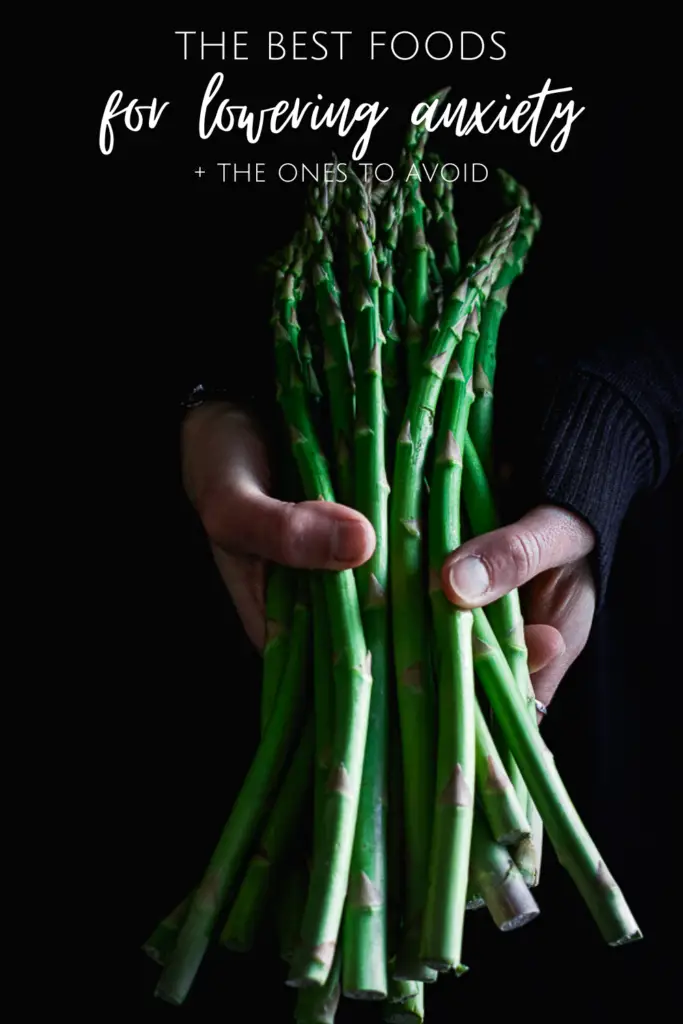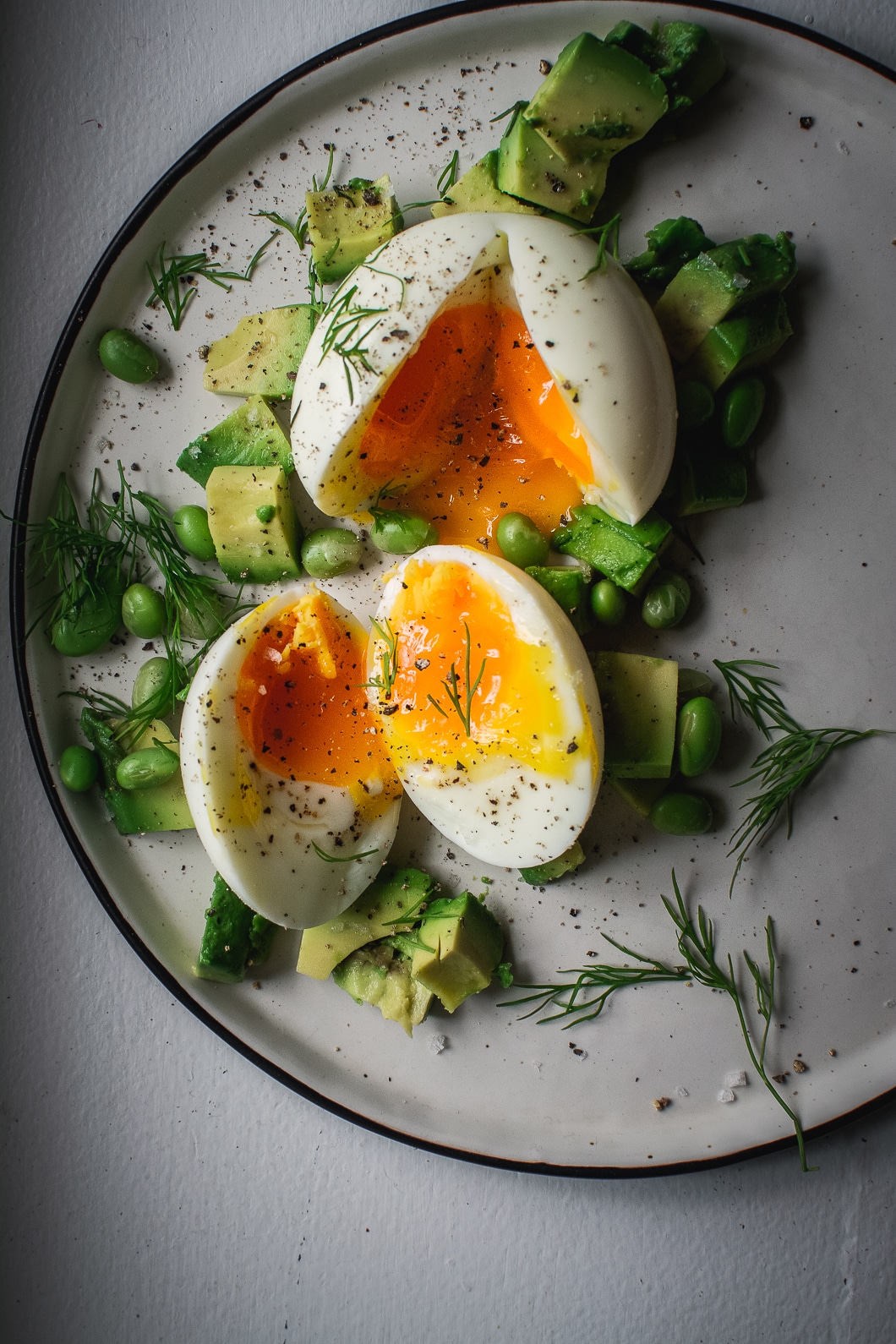By stabilizing blood sugar and supporting the gut, we automatically support the brain. Find out what foods can support and lower anxiety symptoms.

We live in a very stressful world, no one can deny this. Currently, there are 40 million Americans suffering from some anxiety-related disorder ranging from mild to severe. Though it is still taboo to discuss mental health issues openly as one is often perceived as "incapable of handling their shit", many people report feeling some level of anxiety, which leads me to believe that many of us are silently walking around anxious and stressed.
One thing that's often left out when we talk about anxiety disorders, is a person's diet. The food we put in our bodies can have a direct impact on anxiety symptoms. While I think there are other factors that affect anxiety such as lack of sleep, lack of exercise, and lack of social support, today I want to focus on diet, which is a "simple" one to change, if the willingness is there.
What Is Anxiety?
"Anxiety is an emotion characterized by feelings of tension, worried thoughts and physical changes like increased blood pressure. People with anxiety disorders usually have recurring intrusive thoughts or concerns. They may avoid certain situations out of worry. They may also have physical symptoms such as sweating, trembling, dizziness or a rapid heartbeat."
I'm fairly certain we've all experienced some level of anxiety at one time or another. What we often don't stop and consider if how the integrity of our gut can affect our emotional state.
The Gut-Brain Connection
Let's talk about serotonin. Did you know that there is about 400 times more serotonin in the gut than in the brain? Yes, and 90% of the body's overall serotonin is produced in the intestinal tract. There is no doubt why you get butterflies in your stomach when nervous or a gripping stomach ache when you're stressed. The gut and brain are interconnected.
Additionally, if you are suffering from IBS-C/D, leaky gut, SIBO (small intestinal bacterial overgrowth), or other digestive issues, these can impact mental health. One study suggests that anxiety may in fact start in the gut, not in the brain as we previously assumed. Bacteria found in the intestines may actually be responsible for altering brain function as this study suggests.
Nutrient Deficiencies And Anxiety
When it comes to mental health, several nutrients are required in order for the brain to function at its highest capacity. These nutrients include but are not limited to: vitamin D, B12, and B6, folate, zinc, copper, choline, riboflavin, EPA and DHA.
I'd like to point out that vitamin B12 is only found in animal products, so it's possible that unless supplementing, vegetarians and vegans do have a lower level of this important nutrient so it's crucial to pay close attention to this one. Furthermore, low vitamin B12 has been linked to depression. If you want a full post on the importance of vitamin B12, check it out here.
I won't focus on all the micronutrients here as some of them overlap, but I can't stress enough the importance of vitamin B12, D, and EPA/DHA in the form of Omega 3s. Furthermore, zinc is a nutrient that has been linked to reduced anxiety so including food rich in zinc is essential. For additional information on naturally lowering symptoms of anxiety and depression, check out this post.
While these are excellent additions to any diet in order to optimize gut and brain function, it's important to keep in mind the foods that may worsen anxiety. While there is no conclusive evidence that certain foods cause anxiety, consuming highly processed foods on a regular basis can worsen symptoms of anxiety.

The 10 Worst Foods For Anxiety
Sugar
Refined flour
Artificial sweeteners
Hydrogenated oils
Excess alcohol
Gluten
Processed foods
Dairy
Excess caffeine
Soda
But now on to the good stuff. There are simple changes we can make that can positively impact our overall quality of life and help to reduce symptoms of anxiety simply by changing what we put in our bodies.

Best foods for lowering anxiety
Oysters
This study suggests that an imbalance between zinc and copper may potentially trigger anxiety symptoms. Often times copper levels in the body are higher than zinc. "Based on the results presented in this study, we suggest that the low levels of zinc, possibly associated with concurrent oxidative stress, may cause lower GABA and glutamate, having an anxiogenic effect, and that zinc supplementation, raising GABA levels, may help improve anxiety symptoms."
Salmon
I talked about salmon at length in this post, but in this particular study, students were given supplementation of Omega 3s and results show that supplementing with Omega 3s can actually help lower symptoms of anxiety in healthy adults. You can read a complete post all about Omega 3s here.
Asparagus
Rich in folate, this vegetable is one of the best things you can eat. Folate converts to folic acid in the body and has been linked to reduced anxiety. In animal studies, it was shown that an aqueous extract of asparagus stem (AEAS) was successful in lowering anxiety symptoms.
Avocado
Ah, one of my all-time favorite foods. This fruit is rich in B vitamins and research suggests that deficiency in B vitamins has been linked to anxiety. Depressed and anxious patients reported improved symptoms when supplementing with vitamin B complex compared to placebo.
Turkey
Tryptophan in turkey has been a great area of interest and this review evaluates the effects of tryptophan and serotonin on mood and cognition as it relates to the gut-brain axis. An additional study looked at the effects of consuming tryptophan and found that after consuming a diet rich in tryptophan, both anxiety and depression were reduced.
Sauerkraut
There has been much research that suggests that gut health plays a role in anxiety. “The intestine has its own separate nervous system and generates many of the same neurotransmitters (including acetylcholine and serotonin) that the brain generates. These neurotransmitters are very important in promoting gut motility, and too much or too little of them may result in constipation or diarrhea. Similarly, we believe that the brain and the gut can talk to each other. Therefore, it is possible that anxiety and depression may trigger abdominal pain or other GI symptoms. It is also possible that gastrointestinal conditions such as chronic abdominal pain or constipation might also result in anxiety or depression.” I’ve discussed probiotics at length in several posts so you can check these out here.
Eggs
One of the things I’ve found helpful in managing anxiety symptoms as well as maintaining gut health is eating a diet higher in protein and lower in carbs. One amino acid that is a precursor to serotonin is Tryptophan, which is mostly found in protein-rich sources, including eggs.
Dark Chocolate
I’m a sucker for dark chocolate – I think I say that a lot. So the fact that dark chocolate also has mood-boosting properties may just have something to do with it. This study concludes that consuming 40 g or 1.4 oz of dark chocolate, over a 2-week period, had a decrease in anxiety symptoms. Which reminds me, I better pick some up.
Final Thoughts
While there is no magic pill for increasing serotonin unless you take an actual prescription pill, you can boost the serotonin in your gut by including these foods in your diet, increasing protein, and going easy on processed food. And honestly, even if you manage to have a slab of beef with nothing more than salt and pepper on it, you’re better off than most people.







Shelby
Interesting! I wouldn't have guessed asparagus or sauerkraut- awesome as I love em.
Daniela Modesto
Thanks so much, Shelby!! I know, right?
linda spiker
Passing on to my daughter in law! Such great info!
Daniela Modesto
Thank you so much, Linda! I appreciate it!
Kiran Dodeja Smith
So many good ones on here. One of my kids battles anxiety - going to share some of these foods to hopefully help!
Daniela Modesto
I'm so sorry to hear that. It's extremely challenging when it's in children. 🙁